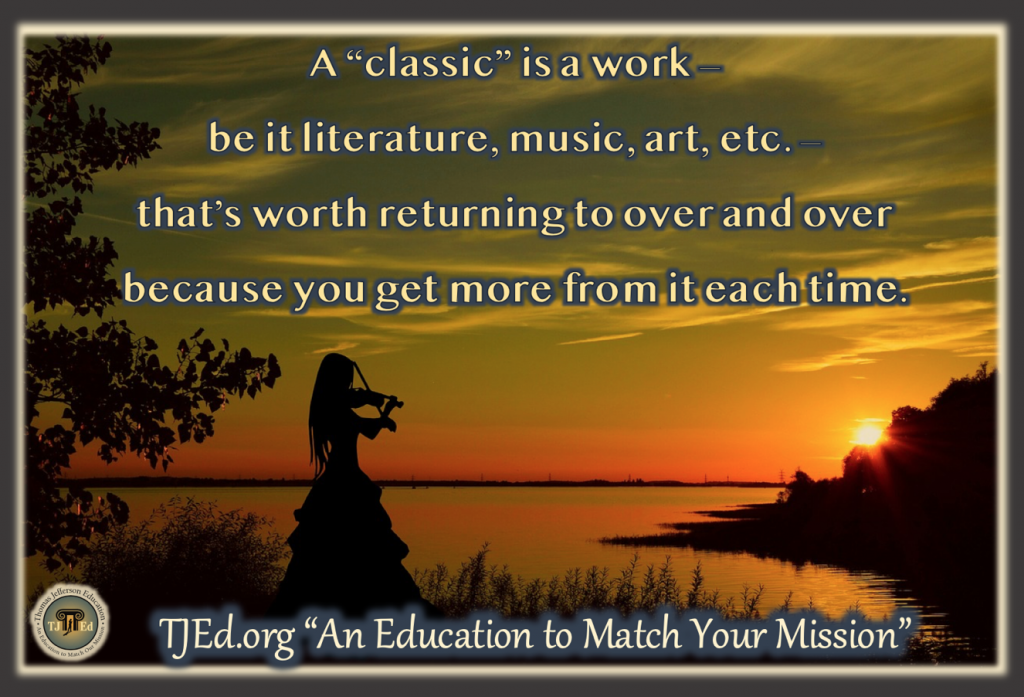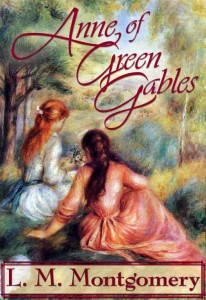Scroll down to view Classics Lists for Family, Youth, Adults, Math, and more!
No one can deny the value of a great idea well-communicated. The inspiration, innovation and ingenuity inherent in great ideas elevate those who study them.
Great ideas are most effectively learned directly from the greatest thinkers, historians, artists, philosophers and prophets, and their original works.
Great works inspire greatness, just as mediocre or poor works usually inspire mediocre and poor achievement. The great accomplishments of humanity are the key to quality education.
A “classic” is a work — be it literature, music, art, etc. — that’s worth returning to over and over because you get more from it each time.
There are many popular lists of classics; and each person, as he or she logs time with the great works of history will hopefully develop his or her own personal classics list.
To edify your family culture of life-long learning, we especially recommend the following titles. Each of these exemplifies a family that is unified in their vision and application of the principles of Leadership Education. Plus, they’re fun to read together!
Family Education Reading List:
- Little Britches, Moody (this whole series is fabulous)
- Understood Betsy (shows the journey of a child who has lost her love of learning, to becoming a confident love of learner)
- Little Men (the principles of Leadership Education are in full display)
- Little House in the Big Woods (a virtual textbook on Core Phase)
- Farmer Boy, Wilder (again–the whole series has wonderful lessons to shape and heal families)
- Laddie, Stratton-Porter (starts a little slow for some readers, but the treasures in this book are soooo worth it!)
- Cheaper by the Dozen, Gilbreth (energetic and parent-inspired excellence!)
As you develop your Personal and Family Classics Reading Lists, you might want to review the following as a good starting place.
 Classics for Young Children and Family Reading
Classics for Young Children and Family Reading
For Support and Resources, click here.
There is treasure in the shared experience of family reading. Nothing can compare with the time we spend together–hands busy and mouths still–listening to a beloved story.
Here are some ideas for titles that can be read together as a family, or for very young readers. Some are more appropriate for Core Phase, some for Love of Learning, etc. You be the expert on your family!
Check out these titles at your library!
An Amazon.com link* is provided for your convenience so you can learn more about each title, read customer reviews, or purchase, if you want to buy your own copy.
*Affiliate links: While your price remains the same, any purchases made on Amazon.com that originate from these links result in tjed.org receiving a portion of the proceeds. So if you’re planning to shop Amazon, please start here! Thanks for supporting TJEd.
Click here to see Biblical Highlights for Young Children >>
 Aesop’s Fables
Aesop’s Fables- Andersen’s Fairy Tales
- Beauty and the Beast
- The Besty-Tacy Series
- The Bible (click here for suggested passages for young children)
- The Blind Men and the Elephant
- “Casey at the Bat”
- Charlotte’s Web
- Chicken Little
- A Christmas Carol (can be scary–use discretion or paraphrase as needed)
- Cinderella
- Dinotopia Series
- Dr. Seuss books
- The Emperor’s New Clothes
- The Story Of The Other Wise Man
- The Gift of the Magi
- The Giving Tree
- “God Save the Flag”
- Goldilocks and the Three Bears
 The Goose that Laid Golden Eggs
The Goose that Laid Golden Eggs- Grimm’s Fairy Tales
- “The Highwayman”
- Hansel and Gretel
- Jack and the Beanstalk
- The Legend of Sleepy Hollow
- “Lincoln, The Man of the People”
- Little Boy Blue
- The Little Engine That Could
- The Little House Series
- The Little Red Hen
- Little Red Riding Hood
- McGuffey’s Readers
- Mother Goose Nursery Rhymes
 “Paul Revere’s Ride”
“Paul Revere’s Ride”- Perloo The Bold
- Peter Pan
- Peter Rabbit
- The Pied Piper of Hamelin
- Pinocchio
- Pollyanna
- The Princess and the Pea
- Puss in Boots
- Rapunzel
- Rikki-Tikki-Tavi
- Rip Van Winkle
- Robin Hood
- Rumpelstiltskin
- Rudyard Kiplng’s Just So Stories
- Sleeping Beauty
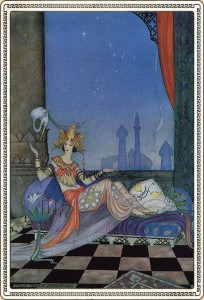
- The Song of Hiawatha
- Snow White
- Tales from the Arabian Nights
- The Three Billy Goats Gruff
- The Three Little Pigs
- The Ugly Duckling
- Tom Thumb
- ‘Twas the Night Before Christmas
- The Wind in the Willows
- Winnie-the-Pooh
- The Wonderful Wizard of Oz
Classics for Young Readers
For Support and Resources, click here.
Here is an introductory list of books that may be of interest to the Love of Learning, Transition to Scholar and Scholar children; please review and categorize according to your family’s criteria of appropriate literature.
Check out these titles at your library!
An Amazon.com link* is provided for your convenience so you can learn more about each title, read customer reviews, or purchase, if you want to buy your own copy.
*Affiliate links: While your price remains the same, any purchases made on Amazon.com that originate from these links result in tjed.org receiving a portion of the proceeds. So if you’re planning to shop Amazon, please start here! Thanks for supporting TJEd.
- Alice In Wonderland, Carroll
- Animal Farm, Orwell
- Asimov on Numbers, Asimov
- The Anne of Green Gablesseries, Montgomery
- Autobiography of Benjamin Franklin
- “Battle Hymn of the Republic“, Julia Ward Howe
- Ben-Hur, Wallace, Johnson
- The Bible (click here for a list of passages itemized by story/content)
- Brighty: Of the Grand Canyon, Henry
- Black Beauty, Sewell
- The Black Stallion series, Farley
- The Chronicles of Narnia series, Lewis
- Collected Works of Edgar A. Guest
- “The Concord Hymn“, Emerson
- A Connecticut Yankee in King Arthur’s Court, Twain
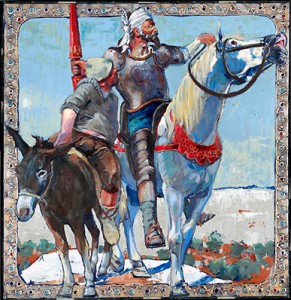 The Constitution of the United States
The Constitution of the United States- David Copperfield, Dickens
- Davy Crockett Legends
- The Declaration of Independence
- The Diary of a Young Girl, Frank
- Don Quixote, Cervantes
- Dr. Jekyll and Mr. Hyde, Stevenson
- Dred Scott Decision
- The Education of Henry Adams, Adams
- Eight Cousins, Alcott
- Emily Post’s Etiquette
- “In Flanders Fields“, McCrae
- Flatland, Abbott
- The Foundation series, Asimov
- Frankenstein, Shelley
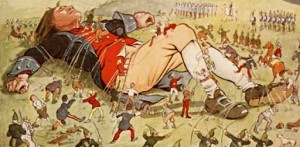 “The Gettysburg Address,” Lincoln
“The Gettysburg Address,” Lincoln- “The War Inevitable”, Henry
- The Great Brain series, Fitzgerald
- Gulliver’s Travels, Swift
- Mythology, Hamilton
- “Hamlet,” Shakespeare
- Heidi, Spyri
- The Hiding Place, Boom
- History Reborn, Anderson
- The Adventures of Huckleberry Finn, Twain
- “I Have A Dream,” King
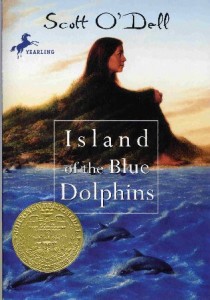 Ivanhoe, Scott
Ivanhoe, Scott- The Hobbit, Tolkein
- Island of the Blue Dolphins, O’Dell
- Joan of Arc, Twain
- Jo’s Boys, Alcott
- Journey to the Center of the Earth, Verne
- “Julius Caesar,” Shakespeare
- The Jungle Book, Kipling
- King Arthur and his Knights of the Round Table
- Laddie, Porter
- The Last of the Mohicans, Cooper
- “Let America Be America Again,” Hughes
- The Lincoln-Douglas Debates
- The Little Britchesseries, Moody
- Little Lord Fauntleroy, Frances Hodgson Burnett
- Little Men, Alcott
- Little Women, Alcott
- The Lonesome Gods, L’Amour
 The Lord of the Rings series, Tolkein
The Lord of the Rings series, Tolkein- “The Man with the Hoe,” Markham
- Mathematicians Are People, Too (2 volumes), Reimer
- Moby-Dick, Melville
- Narrative of the Life of Frederick Douglass
- National Velvet, Bagnold
- Noah Webster’s 1828 Dictionary of the English Language; see also: Online 1828 Dictionary
- North to Freedom, Holm
- “O Captain! My Captain!,” Whitman
- “Old Ironsides,” Holmes
- Old Yeller, Gipson
- Oliver Twist, Dickens
- Paul Bunyan and Other Tall Tales
- The Phantom Tollbooth, Juster
 “The Present Crisis,” Lowell
“The Present Crisis,” Lowell- “The Road Not Taken,” Frost
- The Real Benjamin Franklin, Allison
- The Real George Washington, Parry
- The Real Thomas Jefferson, Allison
- The Robe, Douglas
- Robinson Crusoe, Defoe
- The Sackett Series, L’Amour
- Saxon Mathseries
- The Secret Garden, Burnett
- Soldiers, Statesmen & Heroes, Parry
- Shakespeare’s Sonnets
- Spiritual Lives of the Great Composers, Kavanaugh
- Stuart Little, White
- Summer of the Monkeys, Rawls
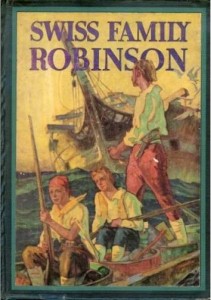 The Swiss Family Robinson, Wyss
The Swiss Family Robinson, Wyss- Tom Sawyer, Twain
- Treasure Island, Stevenson
- The Trumpet of the Swan, White
- The Doctor Dolittleseries, Lofting
- White Fang, London
- The story of William Tell
- Where the Red Fern Grows, Rawls
Classics for Adults
For Support and Resources, click here.
Here is an introductory list of books that you might want to include on your list of classics.
Check out these titles at your library!
An Amazon.com link* is provided for your convenience so you can learn more about each title, read customer reviews, or purchase, if you want to buy your own copy.
*Affiliate links: While your price remains the same, any purchases made on Amazon.com that originate from these links result in tjed.org receiving a portion of the proceeds. So if you’re planning to shop Amazon, please start here! Thanks for supporting TJEd.
- Acton, The History of Freedom
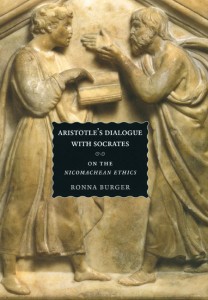
- John Adams, “Thoughts on Government”
- Aquinas, “On Kingship”
- Aristotle, The Nicomachean Ethics
- Aristotle, Politics
- Aristotle, Rhetoric
- Augustine, The City of God
- Aurelius, Meditations
- Austen, Pride and Prejudice
- Austen, Sense and Sensibility
- Bacon, Novum Organum
- Bastiat, The Law
- Bastiat, “That Which Is Seen and That Which Is Not Seen”
- Benson, “The Proper Role of Government”
- The Bible [click here for an itemized list of stories from the Bible]
- Boethius, The Consolation of Philosophy
- Bronte, Wuthering Heights
- Bronte, Jane Eyre
- Carson, The American Tradition
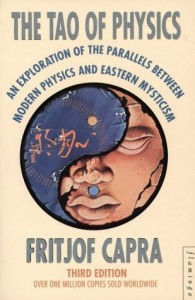 Capra, The Tao of Physics
Capra, The Tao of Physics- Chesterton, Orthodoxy
- Churchill, Collected Speeches
- Cicero, The Republic and The Laws
- Clausewitz, On War
- Confucius, The Analects
- Constitution of the United States
- Copernicus, On the Revolutions of Heavenly Spheres
- Covey, The 7 Habits of Highly Effective People
- Dante, The Divine Comedy
- The Declaration of Independence
- Defoe, Robinson Crusoe
- Descartes, A Discourse on the Method
- Dickens, A Tale of Two Cities
- Dickens, Great Expectations
- Douglas, Magnificent Obsession
- Durant, The Story of Civilization (11 Volume Set)
- Einstein, Relativity
- Emerson, Essays
- Euclid, Elements
- Frank, Alas, Babylon
 Franklin, Letters and Writings
Franklin, Letters and Writings- Freud, Civilization and Its Discontents
- Galileo, Two New Sciences
- Gibbon, The Decline and Fall of the Roman Empire
- Goethe, Faust
- Hobbes, Leviathan
- Homer, The Iliad
- Homer, The Odyssey
- Hugo, Les Miserables
- Hume, Essays Moral, Political, and Literary
- Jefferson, Letters, Speeches and Writings
- Keegan, A History of Warfare
- Kepler, Epitome
- Martin Luther King, Jr., Collected Speeches
- Kuhn, The Structure of Scientific Revolutions
- Lavoisier, Elements of Chemistry
- Lewis, Mere Christianity
- Lewis, The Screwtape Letters
- Lewis, The Weight of Glory
- Lincoln, Great Speeches
- Locke, Second Treatise Of Government
- Machiavelli, The Prince
- Madison, Hamilton and Jay, The Federalist Papers
- Marx and Engels, The Communist Manifesto
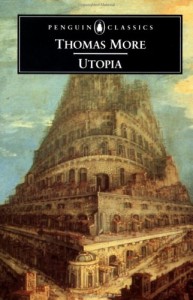 More, Utopia
More, Utopia- The Magna Charta
- Mill, On Liberty
- Milton, Paradise Regained
- Mises, Human Action
- The Monroe Doctrine
- Montesquieu, The Spirit of the Laws
- Newton, Mathematical Principles
- Nicomachus, Introduction to Arithmetic
- Nietzsche, Beyond Good and Evil
- The Northwest Ordinance
- Orwell, Nineteen Eighty-Four
- Plato, Complete Works
- Polybius, The Histories
- Potok, The Chosen
- Plutarch, Lives
- Ptolemy, Almagest
- Shakespeare, Complete Works
- Skousen, The 5000 Year Leap
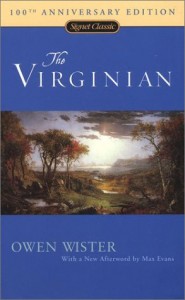 Skousen, The Majesty of God’s Law
Skousen, The Majesty of God’s Law- Skousen, The Making of America
- Smith, The Wealth of Nations
- Solzhenitsyn, “A World Split Apart”
- Solzhenitsyn, The Gulag Archipelago
- Sophocles, The Oedipus Trilogy
- Stowe, Uncle Tom’s Cabin
- Sun Tzu, The Art Of War
- Thackeray, Vanity Fair
- Thoreau, Walden
- Tolstoy, War And Peace
- Thucydides, The Peloponnesian War
- Tocqueville, Democracy in America
- Washington, Letters, Speeches and Writings
- Weaver, The Mainspring of Human Progress
- Wister, The Virginian
Math Classics for Kids
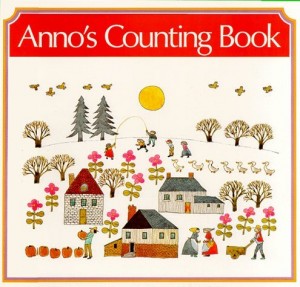 Click here for adult math resources and a list of “Why to Study Math”
Click here for adult math resources and a list of “Why to Study Math”
The Yahoo Group “Living Math Forum” is a great place to discuss and share TJEd-friendly math and math resources with others. Join by clicking here.
Check out these titles at your library!
An Amazon.com link is provided for your convenience so you can learn more about each title, read customer reviews, or purchase, if you want to buy your own copy.
Affiliate links: While your price remains the same, any purchases made on Amazon.com that originate from these links result in tjed.org receiving a portion of the proceeds. So if you’re planning to shop Amazon, please start here! Thanks for supporting TJEd.
- Childcraft, “Mathemagic”
- Math & Magic in Wonderland
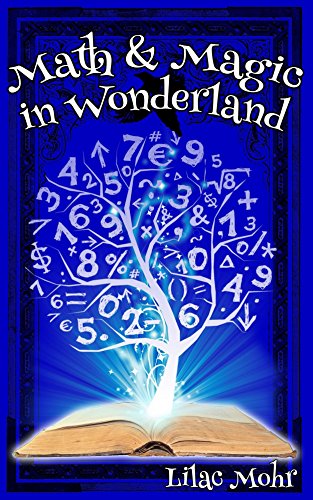
- Donald in Mathmagic Land (DVD)
- Bedtime Math
- Mathematicians are People, Too
- Archimedes and the Door of Science
- The Man Who Counted
- Anno, Anno’s Counting Book
- Anno, Anno’s Mysterious Multiplying Jar
- Burns, Greedy Triangle
- Burns, Spaghetti And Meatballs For All!
- Calvert, Multiplying Menace: The Revenge Of Rumpelstiltskin (A Math Adventure)
- Ellis, What’s Your Angle, Pythagoras?
- Lee, 5-Minute Math Problem of the Day
- McKellar, Kiss My Math: Showing Pre-Algebra Who’s Boss
- McKellar, Math Doesn’t Suck: How to Survive Middle School Math Without Losing Your Mind or Breaking a Nail
- Mohr, Math and Magic in Wonderland
- Neuschwander, Amanda Bean’s Amazing Dream
- Neuschwander, Mummy Math: An Adventure in Geometry
- Neuschwander, Patterns in Peru: An Adventure in Patterning
- Neuschwander, Pastry School in Paris: An Adventure in Capacity
- Neuschwander, Sir Cumference and All the King’s Tens
- Neuschwander, Sir Cumference and the Sword in the Cone
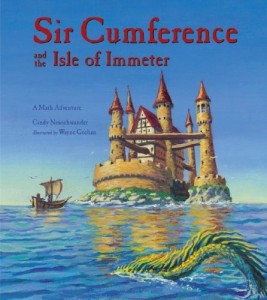 Neuschwander, Sir Cumference and the Isle of Immeter
Neuschwander, Sir Cumference and the Isle of Immeter- Neuschwander, Sir Cumference and the Dragon of Pi
- Neuschwander, Sir Cumference and the Great Knight of Angleland
- Neuschwander, Sir Cumference and the First Round Table
- Ray, Ray’s New Practical Arithmetic
- Scieszka, Math Curse
- Tang, The Best Of Times
- Tang, Grapes Of Math
- Tang, Math Appeal (Mind-Stretching Math Riddles)
- Tang, Math Fables
- Tang, Math Fables Too
- Tang, Math For All Seasons
- Tang, Math Potatoes: Mind-stretching Brain Food
- Tang , Math-terpieces
- Schmidt, The Life of Fred (everything!)
- Secrets of Mental Math
- Math Doesn’t Suck (if you find the title on the cover questionable, get out a permanent marker. It’s worth it, rather than avoiding having it hanging around your house. The content is FABULOUS for learning and teaching math, and is really quite sweet. The title is the most edgy thing, by a long margin, in the whole book)
Adult Math Classics
For Support and Resources, click here.
Math Teaching Helps:
- 7 Steps to Successful Math
- Math 4 Dummies, Geniuses, Parents, Teachers and Homeschoolers
- Math Classics for Kids
- Living Math
- The Yahoo Group “Living Math Forum” is a great place to discuss TJEd-friendly math and math resources with others.
In addition to his reasons to study math, Dr. Henke a list of recommended resources* for advanced study that he freely shared with his students and their parents:
*Affiliate links: While your price remains the same, any purchases made on Amazon.com that originate from these links result in tjed.org receiving a portion of the proceeds. So if you’re planning to shop Amazon, please start here! Thanks for supporting TJEd.
- Schneider, A Beginner’s Guide to Constructing the Universe
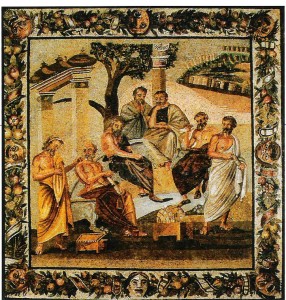 Dunham, The Mathematical Universe
Dunham, The Mathematical Universe- Benjamin, Secrets of Mental Math
- Penrose, The Road to Reality
- Plato, Timaeus; First mathematical treatise of western thought
- Aristotle, Analytica Priora et Posteriora; System of deductive logic and method
- Euclid, The Elements (in three volumes); Exhaustive compliation of Greek geometry
- Archimedes, The Sand Reckoner; Introduces base-ten system, principle of the logarithm
- Archimedes, Method; Foundation of integral calculus
- Apollonius, Conic Sections; Exhaustive work on the conic sections
- Nicomachus, Introduction to Arithmetic; Compilation of arithmetic principles
- Ptolemy, The Almagest; Greek trigonometry used to record star positions
- al-Khowarizmi, al-jabr w’al-muqabalah; First treatise on algebra and Hindu-Arabic numerals
- Fibonacci, Libro di bacci; Introduces Hindu-Arabic numerals to Europe
- da Vinci, Linear Perspective; The mathematical elements of painting
- Stevin, La Disme; Systematic treatment of decimal fractions
- Cardano, Ars Magna; Solves cubic and bi-quadratic equations, imaginary numbers
- Galileo, Two New Sciences; Challenges Aristotle’s law of falling bodies
- Descartes, Geometry; Lays the foundation of analytical geometry
- Fermat, On the Theory of Probabilities; Pascal lays the foundation of probability
 Newton, The Principia; Invention of calculus and defines gravity
Newton, The Principia; Invention of calculus and defines gravity- Bernoulli, Law of Large Numbers; Lays the foundation of statistics
- Euler, Seven Bridges of Konigsberg; Lays the foundation of topology
- La Place, Celestial Mechanics; Applies calculus to heavenly orbits
- La Place (Sommerville translation), Celestial Mechanics [click here for online text]; Expansion of La Place’s work
- Boole, Symbolic Logic; Discovery of symbolic and boolean logic
- Abbott, Flatland; Fictional work about mathematical dimensions
- Poincare, Chance; Probability and statistics [click here for online text]
- Poincare, Mathematical Creation; How to create mathematics
- Mendeleev, Periodic Law of the Chemical Elements; Lays the foundation for the periodic table
- Whitehead, Principia Mathematica; Deepest study of the foundations of mathematics
- Polya, How to Solve It; Problem solving
- Jeans, Science and Music; Lays the foundation for the physics of music
- von Neumann, Games and Economic Behavior; Lays the foundation of game theory
What’s Math Got To Do With It?
For Support and Resources, click here.
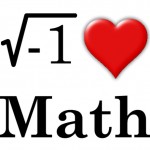 I’ve often said that the “Why” we teach something informs the “How.”
I’ve often said that the “Why” we teach something informs the “How.”
Years ago Oliver wrote an introduction to a math course. He articulated “Why” we learn and teach math, and I think having this vision is not only inspiring and motivating, but really helps us focus our approach and methods. He created a list of “values” that clearly articulates the meaning and purpose of math education, and (along with the introductory paragraphs written by the course instructor, Troy Henke) I share it here with you:
“Mathematics is an integral part of a statesman’s education . . . . Math teaches a person to think in a way that no other field does. As a person studies math, he learns to:
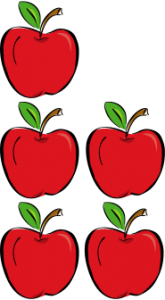 seek and recognize patterns
seek and recognize patterns- explore the relationship between things
- see similarities and also distinctions
- analyze logically but with a deep sense that there is a right answer and a set ideal worth detecting
- compare and contrast
- see things in black and white
- see infinite shades of grey and therefore avoid jumping to conclusions
- seek evidence for conclusions and check opinion with first-hand research
- put his own pen to paper before accepting what society tells him
- seek for absolutes
- remain open to surprising new information which makes past conclusions limited though perhaps still accurate
“Now, clearly, the practical art must also be mastered—we want you to be able to pass any standardized test with the highest marks. But more importantly, we want you to be able to think like an Archimedes, a Descartes, a Newton, a Sophie Germain, an Einstein.”
Our good friend Troy Henke, who taught math to the community youth (including our own kids) gives a list of recommended resources for advanced study that he freely shared with his students and their parents. Click here to view that list.

